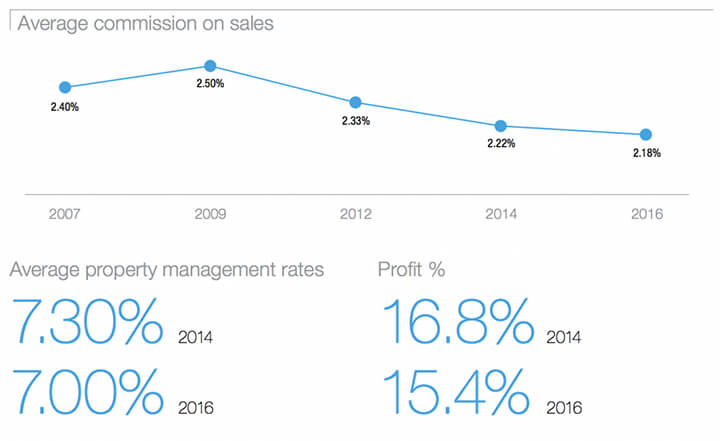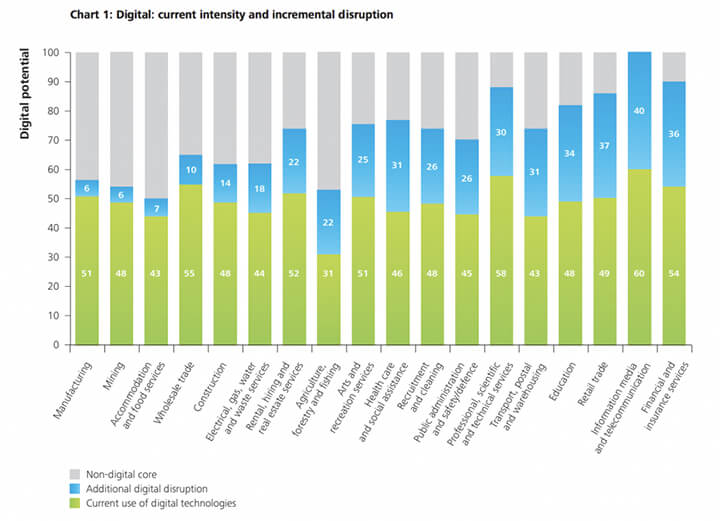January 11th, 2019
Top 10 real estate tech trends to watch in 2019
Property Management
Industry News

The industry as we know it has changed, and rapidly at that. So what does the future of the real estate industry look like?
From increased competition to outsourcing to advancements in technology, let’s take a look at the top trends that are shaping the future of the real estate industry:
 Image credit: Macquarie 2017 Residential Real Estate Benchmarking Report
Image credit: Macquarie 2017 Residential Real Estate Benchmarking Report
According to the Macquarie Residential Real Estate Benchmarking Report, increased competition has led to a steady fall in real estate commissions across Australia. The average sales commission has fallen from 2.5% in 2009 to 2.18% in 2016. Meanwhile, the average property management rate has fallen from 7.3% in 2014 to 7% in 2016, with profits suffering as a result.
New market entrants who are leveraging technology and offering tiered pricing models are putting pressure on traditional agencies. One such example is the emergence of fixed fee real estate agencies in recent years. By increasing their efficiencies and reducing their overheads, they’re able to cut costs and offer lower fees.
To combat this, traditional agencies must introduce new technology to automate tedious tasks and offer a superior customer experience as a point of difference i.e. property management software. Additionally, agencies must look towards diversifying their revenue streams to boost profitability in the long-run.

Deloitte’s 2016 Global Outsourcing Survey indicates outsourcing’s accelerated growth in the real estate industry. As technology continues to advance, real estate businesses will increasingly look towards outsourcing their non-core activities to reduce costs and achieve economies of scale.
These activities might include predictable communication and administrative tasks such as data processing and collection, marketing and design, IT services and accounting, just to name a few.
This frees staff up to focus on income-producing activities and “deliver value-add services around buying, selling, renting and moving that make it easier and less stressful for consumers”, according to CoreLogic’s The Future of Real Estate Report.
Additionally, sustained high turnover rates in property management will encourage outsourcing to increase stability and reduce staff and recruitment costs. Read more on Why Property Managers Leave.
Real estate agents can now conduct paperless transactions, use virtual reality to market properties to remote buyers, qualify prospects using chatbots and untether from their desks with all their data stored in the cloud.
This comes as no surprise, with an increase in internet access speeds, rise of automation and widespread adoption of mobile-centric technologies in recent years. In fact, $5 billion was invested in real estate technology in 2017 compared to $33 million invested in 2010.
In turn, this has shaped the expectations of consumers. Transparency is no longer an option, but rather a prerequisite to providing a great customer experience. Prospective and existing buyers, sellers, tenants and owners want to be able to access their property and financial information at all times.
By offering self-serve technologies like client access via an owners portal, you can proactively service your clients and increase transparency, while reducing the amount of time you spend helping them find information. In essence, you are increasing your efficiencies using technology, which allows you to switch to higher value conversations to provide a better customer experience.
However, further digital disruption is expected in the future of the real estate industry. According to a study conducted by Deloitte, 52% of Rental, Hiring & Real Estate Services currently use digital technologies while a further 22% is expected to be affected by digital disruption.
 Image credit: deloitte.com
Image credit: deloitte.com
Real estate tech companies like WeWork, Airbnb, Zillow, Compass, OpenDoor, Zenplace, Purplebricks and fractional property investment platforms like BRICKX have exploded in the past few years. Facebook and Amazon are also two players to watch as they have invited real estate agents to sell and market their services on their platforms.
Unforeseen disruption is inevitable and it is crucial that traditional agencies leverage technology and adapt to the changing landscape of the real estate industry to reduce the risk of losing their competitive edge. Read more Top 10 Real Estate Tech Trends.

Every day, hundreds of millions of data points are created by real estate agencies, listing portals, CoreLogic, financial institutions, software systems, social media sites, payment gateways and real estate institutes. Effective collection and analysis of these large volumes of data (big data) will underpin the future of the real estate industry.
Machine learning uses sophisticated algorithms to “learn” from these large volumes of data to predict trends and behaviours, unlock valuable insights and drive effective decision-making.
For example, in a similar way to how Netflix suggests movies and Spotify suggests songs, realestate.com.au recommends relevant listings to consumers, based on their search behaviour while logged in to realestate.com.au’s apps and sites. This means that the platform knows what the consumer wants, even before they know they want it. Consequently, this can provide a better user experience and help reduce the property cycle.
One Harvard Real Estate Review on the rise of big data in the real estate industry states that, “The once-shortsighted real estate market can now use forecasting for a wide range of topics: from rent price forecasting (Enodo Score), to tenant turnover in commercial real estate (SpaceQuant), and mortgage default rate forecasting.”
The future of the real estate industry is data-driven and mobile-centric with a renewed focus on the customer experience. It is being shaped by increased competition, digital disruption, outsourcing and big analytics. In order to compete with new market entrants, traditional agencies must leverage technology to drive efficiencies, add value and provide superior customer service.
Hopefully you enjoyed this blog post on The Future of the Real Estate Industry. You might also be interested in Top 10 Real Estate Tech Trends to Watch in 2019, Everything You Need to Know About Blockchain and Real Estate and How Virtual Reality is Transforming the Real Estate Industry.
Did we miss something in The Future of the Real Estate Industry? Please let us know in the comments below.